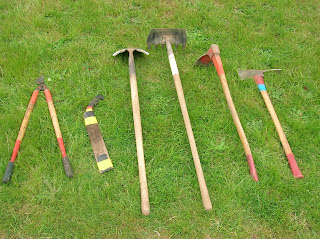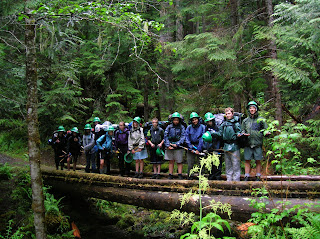7th Grade Backpackers Partner with Washington Trails Association
 Outdoor education lies at the heart of the Explorer West sustainability initiative, and backpacking lies at the heart of the outdoor education program. In addition to cultivating self-reliance and teamwork, backpacking builds character and confidence. Backpacking in the rain builds lots or character, and trail work in the rain tests that character.
Outdoor education lies at the heart of the Explorer West sustainability initiative, and backpacking lies at the heart of the outdoor education program. In addition to cultivating self-reliance and teamwork, backpacking builds character and confidence. Backpacking in the rain builds lots or character, and trail work in the rain tests that character.
Is it possible to "play at work"? This was the theme of the 7th grade spring backpacking trip, a unique blend of "leave no trace" back country travel, public service to Washington's trail users, and as much singing, games, and teen fun as can possibly be had.
 To launch all this, Ms. Krista Dolley, schools coordinator for the Washington Trails Association, (WTA) visited Explorer West prior to the trip to show a video about trail work and to discuss the proper use of trail tools such as the mattock, polaski, and loppers.
To launch all this, Ms. Krista Dolley, schools coordinator for the Washington Trails Association, (WTA) visited Explorer West prior to the trip to show a video about trail work and to discuss the proper use of trail tools such as the mattock, polaski, and loppers.
Then, donning WTA green safety helmets, two groups of 7th graders set off in torrential rains for four days of backpacking and trail work on US Forest Service trails along the Quilcene River on the eastern slope of the Olympic Mountains. Ben's group worked up the Lower Quilcene River, while Aurora's groups worked their way down. Together, the two groups cleared four miles of gorgeous riverside trail.

Loppers were the tool of choice, as the kids quickly learned how prolific and green the trail side growth can be in this temperate rain forest. Under a canopy of old growth cedar, hemlock, and douglass fir, intrepid young Explorer West trail workers trimmed Devils club, shrubs, and conifer saplings to clear the way for spring and summer hikers and horse riders.

Aurora, Ben, and WTA supervisors were all impressed with the kids' stamina and determination to make progress, despite incessant rain and thick undergrowth. This work goes to the heart of the Explorer West sustainability ethic: meeting our own present needs for a safe, productive, and fun backpacking trip, while ensuring that future generations of hikers can do the same on safe, clear trails.
